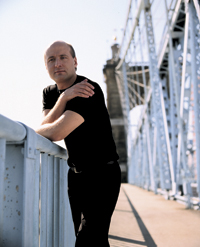CSO DVD: Remembrance of Things Past

Maestro Paavo Jarvi counts his Sept. 14, 2001, CSO debut among his most cherished moments. The performance is now available on DVD.
Remembrance of Things Past
The CSO's first DVD commemorates Paavo's historical debut
Interview By Alan Scheidt
CityBeat, November 21, 2006
An artifact, according to my American Heritage Dictionary, is "an object produced or shaped by human workmanship ... an ornament of historical interest." This month the Cincinnati Symphony Orchestra released an artifact of sorts, its premiere DVD entitled The First Concert: September 2001, which commemorates Paavo Jarvi's inaugural performances as music director of the CSO.
Originally filmed by Brandenberg Productions for broadcast on PBS, this beautifully crafted DVD is drawn from the first weekend of performances in Music Hall just days after Sept. 11, 2001. The program that evening included the World Premiere of Charles Coleman's "Streetscape" as well as Debussy's venerable "La mer" and Tchaikovsky's Fifth Symphony. Scheduled cellist Truls Mork was unable to fly into the U.S. and Samuel Barber's famous "Adagio for Strings" was substituted as a tribute to the fallen.
I was in attendance on opening night, Sept. 14. Charged with emotion, that evening remains the most memorable of my arts-going life. Recently, I had the opportunity to discuss the new DVD with Jarvi and share memories of a time that was, in more respects than anyone could have anticipated, the beginning of a new era.
Alan Scheidt: This is the first time the CSO has produced a DVD. How did it come to be?
Paavo Jarvi: It was made as a television program, but we wanted it for ourselves, too. It would be a living history of ours. It is much more than a commercial undertaking. I like the fact that it just exists, that it is part of our legacy.
AS: Your first rehearsal was on 9/11. You literally began your career with the CSO as the planes were flying into the twin towers.
PJ: My first thought was that my tenure here is doomed -- this is obviously not a good sign. I'm thinking, "Somebody is trying to tell you something." Of course, now, looking back, I can say it was a kind of numbness. There was serious consideration of canceling because some people said it wouldn't be right to play music in such a horrible circumstance, and I said, "This is exactly when you need to play it."
AS: Was that why you decided on the Barber "Adagio?"
PJ: It became a question of should we add something or not. It was so ... right. It's amazing just how powerful that piece actually is. There's no need to explain it; it's just there. It's strong in emotion, but not sentimental. It's not asking for pity music. It's about inner strength. It has a sense of mourning in it, something universal. It's a masterpiece.
AS: Sometimes standing ovations are obligatory in Cincinnati, but that night a crowd of 3,000 literally leapt to their feet not once but three times, including when you first walked onstage. What was going through your mind?
PJ: I had mixed feelings because I felt in the beginning that maybe we should have canceled. Maybe it wasn't the right thing to do. I walked out onstage and I saw the sort of reaction. People were so warm, so accepting. And another thing that put me immediately at ease was when I gave the cue to the snare drum for the National Anthem. The minute people got up ... never have I heard before or since that sort of participation. I, of course, didn't have much sense, much understanding of this community. You never know in the beginning. And when people began singing I knew, of course, the only thing you can do is have a concert. Not to do a concert would have actually been really wrong.
AS: The situation didn't just thrust you onto the Music Hall stage. You were, in essence, thrust onto the world stage.
PJ: That's one of the reasons I'm glad this DVD exists now. To have the proof of it, the proof that it actually happened. For me it was very special. For me it's quite touching to see how nervous I am. And on top of everything else, there was a cellist who fainted. And my first thought was, "My God, he's dead!"
AS: Sort of, "What the hell else can happen?"
PJ: There you go -- what else is going to happen? And so I had to get off the stage and come back. And it was very funny because the first thing, when he opened his eyes, he said, "Is my cello OK?" (He laughs.) Not, "Am I still alive?" No. "Is my cello OK?"
AS: I've always thought of that evening as being Dickensian, sort of the best of times and the worst of times because we were seeing the very best we had to offer as humanity in light of the very worst. Music made all the difference.
PJ: It made a lot of issues clear. What is the social importance of music? Music is sometimes treated as a sort of soundtrack to life, but not really the event itself. But there is something really unifying about music. I don't know one really important event that isn't marked by music. We send our people to war with music. We play it at funerals, christenings and bar mitzvahs. I don't know one wedding that doesn't have music in it. There are a lot of situations that have no place for words. You don't talk to your child when you want him to fall asleep; you sing. There is something about music that is so incredibly basic to us. I think it's healing.
THE FIRST NIGHT is available for $20 by calling the CSO at 513-381-3300 or by going to www.cincinnatisymphony.org
Comments